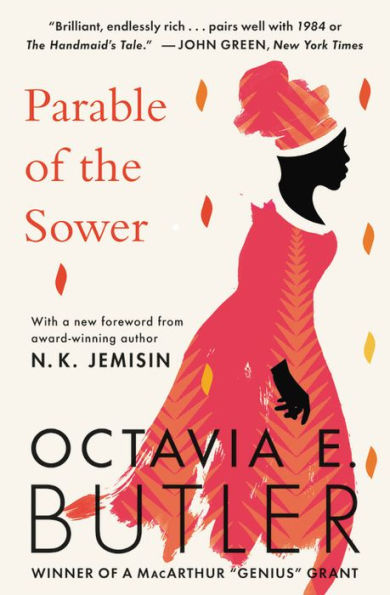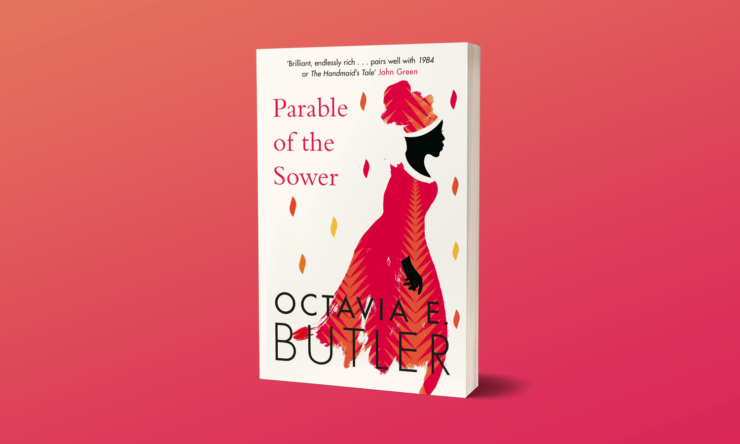Today, 22 April, is the fiftieth anniversary of Earth Day. Under different circumstances, there would probably be big outdoor concerts for fund-raising or maybe community-wide cleanups. This year, we’ll be celebrating the earth online.
An adaptation of a classic dystopian novel connected to Earth Day is giving a new, digital audience reason to be optimistic. The story is about climate catastrophe, class warfare, dogmatic religion, and a president who believes so devoutly in capitalism that he sells an entire town to a private corporation.
Octavia E. Butler’s 1993 Parable of the Sower, which is set in 2024, is now almost always tagged with the word “prescient” because with every passing year, it seems to become more relevant. It makes sense to think about Parable on Earth Day because so much of the novel is concerned about Earthseed, the name that Lauren Olamina, the novel’s heroine, gives to her spiritual beliefs—beliefs that challenge the religious orthodoxy of her preacher father.
On this particular Earth Day, the musical version, which illuminates Butler’s story in a powerful—and joyous—fashion will be available to livestream through the NYU Abu Dhabi Arts Center @ 8pm GST (that’s 12pm EST). The adaptation was created by Bernice Johnson Reagon, a civil rights activist and founder of the a cappella ensemble Sweet Honey in the Rock, and her daughter, the artist and activist Toshi Reagon. Drawing on everything from funk to folk to gospel to blues to rap, the show began as a concert for a suite of voices and a kickass band and has evolved into an opera.
The concert version of the show will be streamed on Earth(seed) Day by the Arts Center at NYU Abu Dhabi, as part of their “Reconnect” series. The streaming version will be a re-broadcast of the 2015 performance that inaugurated the opening of the Arts Center. Bill Bragin, the Arts Center’s Executive Director, told me that he loved the show’s emphasis on the power of “found communities,” because it was such a good fit with a university whose student body comes from more than ninety different countries. “Parable,” says Bragin, “sparks conversations about adaptation, creativity, and the importance of connection.”
Buy the Book


Parable of the Sower
Speculative fiction, as writer Nalo Hopkinson has said, “can impel the reader to view things differently…grope for a new perspective on the world.” Butler’s novel starts us on such a journey and the musical version takes us even further. About mid-way through the concert version, Creator Toshi Reagon addresses the audience, saying that the one thing missing from the novel is music: “Where is the folksinger,” she asks, “just sitting there, going, ‘this is horrible…’.” The audience laughs because the music that’s being created onstage is anything but horrible, and Reagon continues, saying, “Where are the musicians? We are totally down for the revolution.” That little shtick (repeated in the opera version), becomes the lead-in to a song about Olivar, the town taken over by a corporation that promises its inhabitants safety in exchange for labor. In the book, Lauren thinks the offer sounds suspicious, but Reagon—the folksinger—amplifies that suspicion into a rousing call to action: “Don’t let your baby go to Olivar,” she sings, and then the chorus joins in, chanting “fight, fight, strategize, stay together, equal rights.” The musicians bring to the fore what is only implied by the novel, and the audience, when I saw this show in 2015, joined in, stamping their feet and clapping their hands. The music invites our participation and as our voices join the chorus, the song becomes our own.
When we read, particularly if we’re reading something as brilliant as Parable, the words also become ours, in some sense—but the process is a solitary one, even if we talk about the book with other readers. The experience of being in the audience of the musical version is collaborative: as we listen and sing and applaud, we form a community. The concert version builds this sense of community, drawing on the long tradition of call-and-response to include and sometimes challenge us.
One of the central challenges in the novel, amplified in the music, is the challenge to change our relationship to the planet. This challenge fits with Earthseed’s central tenet: “the only lasting truth is Change. God is change.” Change of any sort might seem, on the eight-zillionth day of shelter-in-place, almost impossible to contemplate, given that most of us are just shuffling from couch to bed to kitchen with perhaps a scenic detour through the bathroom. And yet change seems inevitable after this viral pause, and so we might ask ourselves the question posed by the Parable chorus: “there’s a new world coming, everything gonna be turning over; where you gonna be standing when it comes?” In the power of the chorus’s a cappella voices braiding together, anything seems possible, even a revolution in our attitudes towards the planet.
In a recent interview, Reagon talked with me about the possibility of this “new world,” particularly as it connects to a greater environmental responsibility. Butler started her novel as a way to explore how something positive can be created out of negative circumstances, Reagon explains during the concert, and in our interview she claims that we can do the same thing: “One of the biggest lies that’s fallen away [recently] is that we can’t have a better relationship to the planet, that it would cost us too much money to change.” But now everyone is changing their behaviors, as the photos of the suddenly clear skies over cities like Nairobi, Delhi, Los Angeles, and Beijing will attest. Change is possible and, as Reagon reminded me, people who work with alternative energy industries “have been telling us this for years.” We just have to rise to the challenge of “transforming out of ourselves, emotionally.”
Lauren and her companions make it to what seems like safety at the end of Parable and begin to shape their new settlement, which they call Acorn. Their group has a few ground rules: they’re not going to kill one another; they’re not going to eat one another; they’re not going to steal from one another; they’re going to watch each other’s backs.
It seems like a pretty low baseline but, as Reagon says, “We have to have each other’s backs. It’s the corniest thing in the world, but it has to be there. At the baseline of connection and of any possible collaboration is, you’re not going to kill me, you’re going to watch out for me. And with that you can get through a lot of the other stuff.” We can survive if we care for one another, Reagon explains, as well as understanding ourselves to be “one with this planet … part of that physical and mystical rhythm, which is… spectacular and amazing.”
Butler imagines Acorn in this way: it is a node in a network, a point in a constellation, rather than the apex of a resource pyramid. In this re-imagined community structure, horizontal rather than vertical, we see the key to a healthier relationship with the planet.
The Parable singers embody this idea of connection without domination in that while there are solo pieces and Reagon sits at the center of the semi-circle of performers, it is very much an ensemble piece that provides a role for the audience, as well. Reagon says that “the vibe of the show” comes out of the workshops that precede each performance, so that no single performance will ever be quite the same.
The ferocious creativity of book and music asks us to look anew at our relationships, including our relationship to the planet, which is the idea that fuels the final two songs of the concert version. The penultimate song is an anthemic chant sung by the entire ensemble with the audience invited into the chorus: “as wind as water as fire as life, god is change, the only lasting truth is change.”
The final song is an a cappella version of the parable from the Bible that gives the book its title, which reminds us that while not all seeds flourish, “some seed falls on good ground and come forth bearing fruit, a hundredfold, a hundredfold.” The music of Parable is one of the fruits of this novel, and that, in turn, reveals to us the seeds of change.
Deborah Williams is a writer and literature professor based in Abu Dhabi. Her work has appeared in such places as The New York Times, The Rumpus, Inside Higher Ed and The National; she is currently at work on a book about monsters and cosmopolitanism in YA fiction and can be found on Twitter @mannahattamamma.










